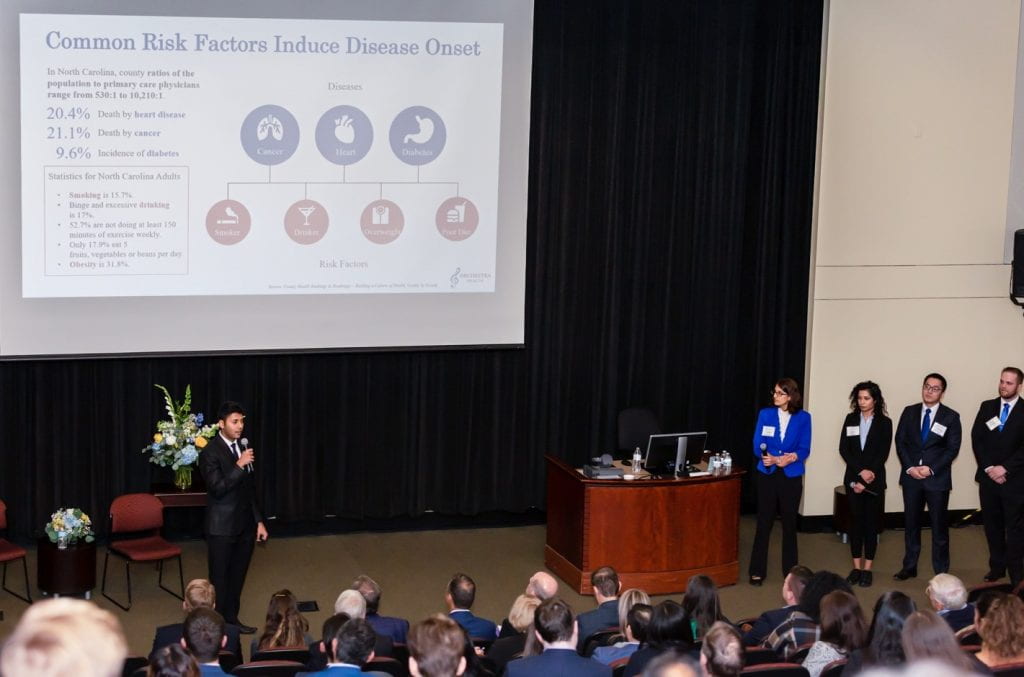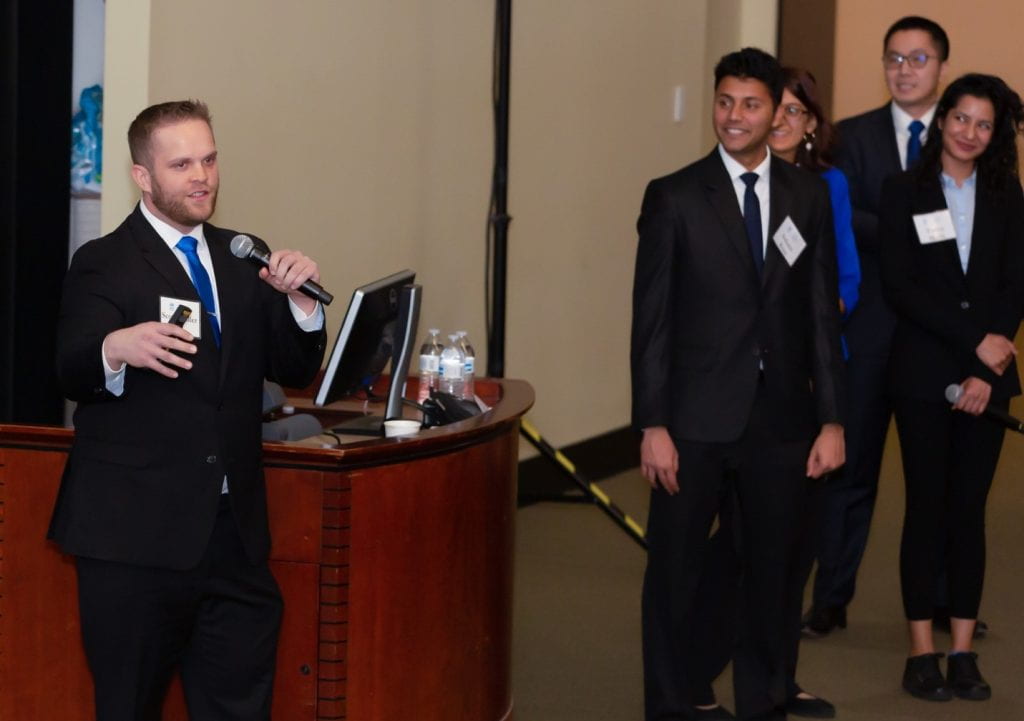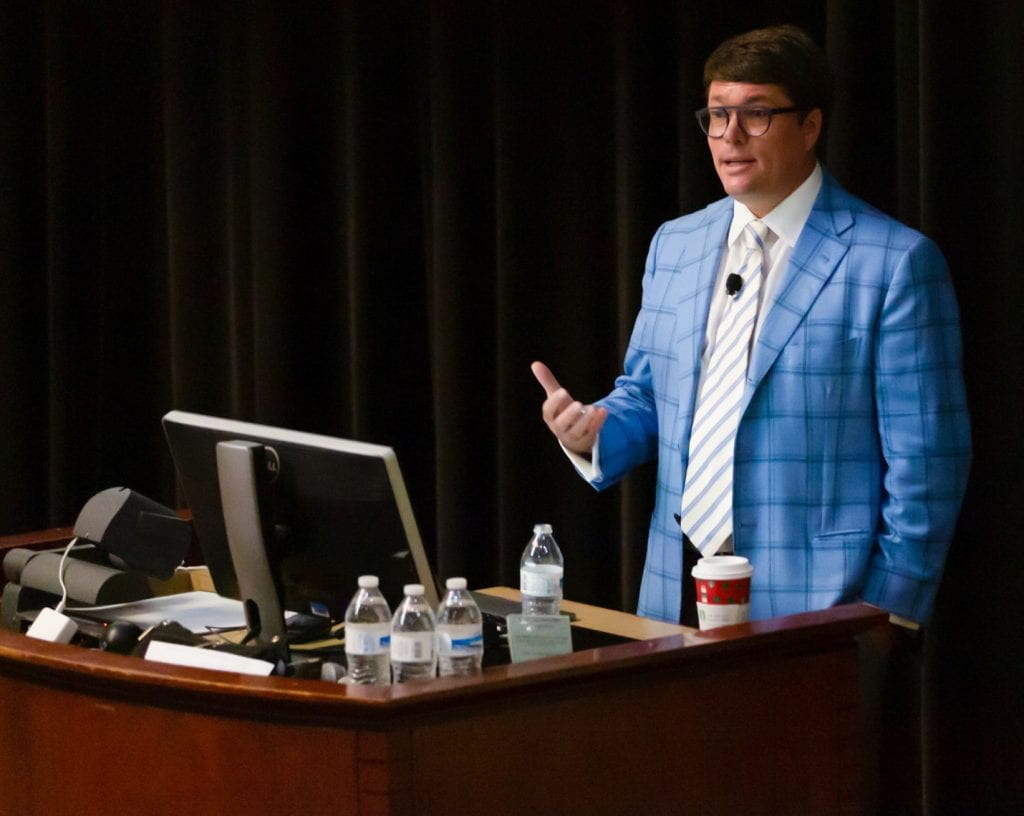
(Indiana University’s MBA case team delivered a presentation that won 2nd place at the UNC Healthcare Case Competition. Listed from left to right are team members:Soham Bose, Cullie Poseria, Tanya Malik, Jimmy Wang and Scott Miller. Photo Credit: Steve Rubin, Kenan Institute)
It was November 8th when a team of five Indiana University (IU) MBA students walked onto University of North Carolina (UNC) at Chapel Hill’s auditorium stage in front of around 150 attendees to deliver their recommendation for a population health management program for a fictional insurance company, Orchestra Health. Their presentation, titled “Orchestrating Outcomes with Population Health Services,” featured a subtle musical theme, an illustrative patient journey and strong research data (in addition to the typical financial, marketing, implementation and risk mitigation tactics required in a case presentation) that helped land them in the final round against the home team, UNC.
(Their recommendation focused on preventative services to help achieve Institute for Healthcare Improvement triple aim objectives, as seen in this sample PowerPoint slide.)
The 2019 Healthcare Case Competition and 9th Annual UNC Business of Healthcare Conference were hosted by the Center for the Business of Health and the Healthcare Club at UNC. The case competition prompt, which was sent two weeks earlier to teams, put students’ knowledge of the sector and business to the test. Cullie Poseria, who led the IU Kelley School of Business team remarked,“Not only was this the first case competition for our team members, but the prompt carried a wide scope. It asked us to look at many areas of business and how everything was connected to the payor side to formulate a comprehensive, innovative (but practical) strategy. This was a fun challenge, as our team members have had limited healthcare experience, and we had very little understanding of the payor side.”
(Scott Miller, an IU JD/MBA, talks about example North Carolina patient Rick and how their health solution for Orchestra Health would impact Rick’s life. Photo Credit: Steve Rubin, Kenan Institute)
While their work experience in healthcare was limited, it’s clear that IU’s business and healthcare programs gave students the exposure they needed to be set up for success at the competition. Poseria mentioned that one of the judges had immediately appreciated the large amount of research the team had completed in creating the “most comprehensive pitch he had seen that day” in their 15-minute preliminary round presentation and 5-minute question and answer session. She added,“I’m glad that I had taken the healthcare business classes we have at IU, because I was able to pull pieces of my understanding of the industry from what we learned into helping us pressure test our various ideas and solutions.”

(This PowerPoint slide shows a bit of how the team took case study research numbers and connected them to their financial analysis projections.)
This case competition allowed the IU students to gain exposure to some industry hot topics, but it also allowed them to get in front of judges from sponsoring companies like Amgen, Cigna, North Carolina Department of Health and Human Services, Blue Cross Blue Shield of North Carolina, PricewaterhouseCoopers Healthcare Advisory Practice and Optum. Other sponsors included top sponsor Johnson & Johnson as well as GlaxoSmithKline, Humana, UnitedHealthcare, Avance, Bristol-Myers Squibb and Eli Lilly and Company.
Conference sessions occurred simultaneously as the competition and offered attendees opportunities to network with professionals across the health and life sciences industries, but the agenda also had educational sessions about cutting-edge topics like artificial intelligence and precision health. The keynote speaker, Jeff Arnold, who founded WebMD and Quality Diagnostic Services, is a chairman at Forbes and was the CEO of HowStuffWorks.com that sold to Discovery Channel presented about his latest community-driven healthcare mobile application called Sharecare to a nearly full auditorium.
(The keynote speaker, Jeff Arnold, delivered an engaging talk about the future of healthcare data in relation to his startup called Sharcare. Photo Credit: Steve Rubin, Kenan Institute)
Following a long day of excitement and learning, teams gathered at a reception with the organizers and sponsors to listen as IU was awarded 2nd place and a $5,000 prize. The first-place prize of $10,000 went to UNC, who also beat out Yale University, Emory University, University of Virginia, Duke University and University of Minnesota.
Overall, the team was grateful for the growth opportunity that was made possible due to the support of the IU Center for the Business of Life Sciences (CBLS) covering their expenses. Jimmy Wang, a team member, said “It was a well-established case prompt they gave us. The depth of the project was no doubt the highest of all of my MBA projects (even more than my internship project). It is amazing that we digested and fabricated a plan in one week! I really appreciate IU’s PLUS Life Sciences Academy and George Telthorst’s (the director’s) support during the competition prep. I hope more Kelley students can attend such events in the future.”
They felt it was a rewarding experience (literally and emotionally), and they were impressed by the level of professionalism, hospitality and organization of the host university.
(The two winning teams pose at the closing reception with two of the judges pictured in the center, Steve Moore, a retired PwC partner, and Christos Georghiou, an executive director at Amgen. Photo Credit: Steve Rubin, Kenan Institute)
To give prospective students more information about the experience of the team, the CBLS conducted an additional question and answer session. Read on to learn more!
Q: “Why did you choose to participate in this specific case competition?”
Tanya Malik: “I’m trying to break into the healthcare sector and since I had not participated in any case competition before, the UNC Healthcare Case Competition presented a unique opportunity where I could get exposure to a complex and relevant health problem and also work together with my team to come up with a feasible solution. As a member of the PLUS Life Sciences Academy offered by IU’s Center for the Business of Life Sciences, I also wanted a chance to be able to blend academia and the real world in a practical way to get valuable feedback from industry experts on our strategy and recommendation.”
Q: “Cullie, what was it like to lead the IU team?”
Cullie Poseria: “It was a unique chance to practice my leadership skills. I’ve led filmmaking teams in my career prior to the MBA, but this situation had a competitive atmosphere and different required skillsets. In our first meeting, we realized that we had the combined strengths to win, so the team decided to go after the first place prize. The main thing I tried to focus on while leading was just keeping everyone involved and on the same page. With lots of research plus ideas swirling around and a tight deadline, this was an interesting challenge. We solved this by meeting in person versus what we tried initially with phone calls and online meetings. Working together was fun, as I got to know each of the members through the process—their workstyles, their backgrounds and their motivations. I’m also proud of the team after having seen how far we came in just 2 weeks!”
Q: “What were all the different priorities you had going on during this competition? How did you tackle time management for this case competition?”
Scott Miller: “Since I’m completing both my JD and MBA as a dual degree student, time management for this case was difficult as I had to travel back and forth from the law school to the business school while networking and interviewing for a full-time post-graduation job. I did what I always do, which was to create a list of school and social priorities, except this competition trumped both of those lists. Since I wanted to win this competition, I read and took detailed notes on the case as soon as it was released. I gave up some time which should have been dedicated to my studies and social life to put towards the case, but I thought the experience was something I would be able to talk about in interviews, and I saw the exposure to the sponsors as a benefit. I was highly motivated by the prospect of bringing the spotlight to the Kelley School of Business.”
Q: “How did this case competition challenge you?”
Jimmy Wang: “The biggest challenge for me was to build a comprehensive business case with a full implementation plan, even while lacking the necessary industry knowledge. The requirement for the case was not just giving some ideas, but we needed to consider the business viability, financial sustainability and customer relationships. It took us a lot of time to research existing cases, interviewing professionals and testing ideas with experts. I believe our winning 2nd place is due to the extensive research we conducted. In addition to that, I took on tackling the financials even though I am a marketing major with limited financial experience. This was tough because it made me think about all the requirements for a sound return on investment, a breakeven point and more. It did push me out of my comfort zone a bit, but I’m glad I did it because I was able to learn a lot.”
Q: “What was the most interesting thing you learned when doing the case research?”
Jimmy Wang: “Everything. I mean it was a really mind-blowing process when I started to work on so many concepts and systems that I had no idea about before. The impact of population health management and a value-based payment system are really impressive but complex. I learned so much from the case that it instilled more confidence in me when I went to present our idea to the judges.”
Q: “Pick a teammate. What did you learn about this person when working together on this project?”
Tanya Malik: “Prior to this case competition, I wasn’t aware of Jimmy’s lighthearted nature. I had seen him as intelligent and hardworking albeit a quiet classmate, but those long hours spent in school doing research and problem-solving in the week preceding the case competition made him more open with us, and I thoroughly enjoyed working with Jimmy and learning from him. Not to mention, I enjoyed learning that he will impart rare gems of philosophical wisdom to you when you most need it!”
Q: “What most surprised you about the process and competition?”
Scott Miller: “The thing that most surprised me about the competition was how easy it was for our team to center on the direction we wanted to go with the case. I expected a lot more brainstorming and push back, but we agreed pretty quickly on the route to take. I was also surprised by how well we did! I was not expecting us to perform so well, but people will surprise you if you let them, and they did. I had a great time and got to know some people I wouldn’t have otherwise interacted with, and that was the greatest benefit.”
Q: What was the most rewarding part of participating?”
Soham Bose: “The most rewarding part of the competition was traveling and representing my school at a large event. It was indeed an honor.”
Q: “Can you share about the networking opportunities you took advantage of?”
Cullie Poseria: “Sure. Since we were focused on the competition, we did not get as involved with participating in the full conference. We did attend the keynote speaker presentation, and I also watched another afternoon speaker presentation. There was some networking I got to do between presentations and at the competition reception when I met some of the UNC student hosts, competitors, judges and sponsors. My teammates actually had some friends that were students at UNC, so I got to meet a few of them at dinner, a Diwali party we went to and the MBA designated bar for later that evening. I would say that my best connections were made with a couple of the judges and the head of the Center for the Business of Health during the reception and a few students we met at the evening cultural events that I’ve since connected with on LinkedIn. Everyone we met was nice and professional.”
Q: Any other thoughts/things you would like to share with future participants?”
Scott Miller: “The only thing I would say is that you truly never know what will happen, so preparing yourself for the worst as well as for the best is the best course of action. I feel that had we had more time to practice our presentation, we would have best prepared ourselves to win the competition, but that is all on us.”
Soham Bose: “It may be good for IU to conduct an internal round to decide on the final team to be sent for such case competitions in the future as that increases the level of preparation significantly. I would advise next year’s team to practice the presentation a few times before actually presenting. A thorough prep would have landed us the first prize.”
Tanya Malik: “I think our recommendation strategy as well as our research were very comprehensive, but I feel we could have done a better job at verbalizing those ideas and effectively communicating them to the judges. One of the pieces of feedback we received from the judges was that we could have delved deeper into the engagement strategy component of our recommendation, and we had actually prepared a highly detailed slide for this question, but in the interest of time, we had moved that part to the appendix. That could’ve been a significant differentiator for us. I feel that we could’ve performed better if we had allocated a little bit more time to the presentation aspect of the competition rather than the research. That being said, I still feel immensely proud of our performance and the positive feedback we received from the judges.”
Cullie Poseria: “I agree with the other teammates’ comments. I had originally sketched a timeline our team could follow to give us enough time to prepare, however, many of the team members got hit with job interviews the week we received the prompt. That meant that we did not get to even meet till three days after the prompt came out (and our second meeting was two days later). I felt that our late start and loss of the first week led us to scrambling to complete the slides and compressed all the practice to the night before and day of the competition. Next year’s team should prioritize the competition, and they should start immediately, even if they have to meet without all the team members there (it’s always hard to coordinate this many schedules). Think like a winning team from the get-go, ‘What would a winning team do?’ Something that really helped us was that we tapped into our network to expedite our research. Since we were allowed to consult with professors and industry experts to do primary research, we took good advantage of that and the judges appreciated the extra mile we went!”
About the Kelley School of Business and the Center for the Business of Life Sciences:
The Indiana University (IU) Kelley School of Business has a unique program run by the Center for the Business of Life Sciences (CBLS) called the PLUS Life Sciences Academy, which allows MBA students to learn about the life sciences and healthcare industries through classroom discussions but also to take part in numerous interactions with professionals from companies like Eli Lilly and Company, Abbott Labs, Anthem, Zimmer Biomet, Mead Johnson Nutrition and more. Students can choose to complete certain course requirements to obtain a certificate of participation, and they also have opportunities to do hands-on consulting work for companies like Cook Medical and IU School of Medicine. The CBLS sponsored IU’s team of MBA students for the UNC Healthcare Case Competition.




Leave a Reply